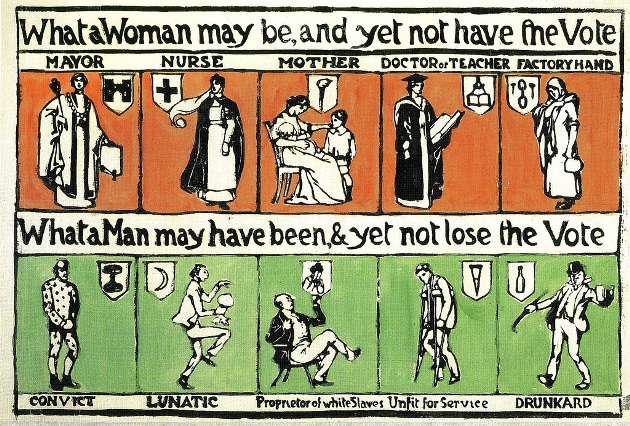Do Women's Votes Matter?
Curator Masum Momaya introduces “Voting”
The vote is a symbol of a citizen's full participation in government affairs. A vote is a consent to laws, rules and regulations, sometimes freely given, other times with notable hesitation. Historically, as democracies were established, the right to vote soon followed--at least for men, not for women and members of non-dominant racial groups. Today, women can vote almost everywhere in the world, but do their votes really matter? And what about the few remaining countries, including Saudi Arabia, where women still cannot vote?

Women's campaigns for suffrage, or the right to vote, began in the 19th century. Suffrage comes from the Latin word suffragium, meaning "voting tablet."
Ironically, some of the staunchest opponents to women's suffrage were well-educated women. They argued that, as the majority of women were still illiterate, it would be dangerous for them to have the right to vote. Female opponents also worried that gaining the vote would change gender roles in the home and undermine women's traditional roles as mothers and wives. Voting was also "unladylike" as it forced women to enter the bustling, and sometimes thorny, realm of politics.
Equality was not the most common rationale used in suffrage movements. Many suffragists argued that women had different and special contributions to make to the political system, including concern for the welfare of children and families. Additionally, men in the temperance movement helped pave the way for women's suffrage as they assumed that women were more likely to vote for prohibition.
American women were the first to fight for women's suffrage, but it was New Zealand's women who first earned the right to vote in 1893. By the middle of the 20th century women in most countries had won the right to vote. But in some cases, this victory had racist underpinnings.
For example, some suffragists argued that, since African American men were allowed to vote in the U.S., white women should be allowed to as well. This was true in Canada, where naturalized immigrant men from Central Europe gained suffrage before white women and in New Zealand, where indigenous men had the right to vote before white women.
Also, male nationalists in colonized countries such as Algeria were sometimes advocates for women's suffrage as they needed the active support of women to help fulfill their dream of independent, modern states.
It is often assumed that voting leads the way to full legal, political and social equality for women. But in less than a handful of countries, such as Norway and Rwanda, do women have actual equal political representation. Due to the institution of gender quotas, or mandates for equal representation, countries such as India and South Africa are on their way.
Winning the vote does not always mean it is easy to cast a ballot. In Lebanon, for instance, women have to show proof that they have completed elementary education in order to be able to vote. Meanwhile, voting is compulsory for all Lebanese men, and proof of education is not required.
In several places in the world, women's suffrage was granted and later retracted. Egypt granted women the right to vote in 1956. But from the start, the theocratic state obstructed women's political rights by banning feminist organizations and suppressing the public expression of their views. Thus the same year that the state granted women the right to vote, women were suppressed as independent political actors.
Similarly, Iran, which had granted women suffrage in 1963 and passed numerous women's equal rights legislation in the 70s, repealed all these gains when the revolutionary government of Ayatollah Khomeini came to power in 1979. Women were eliminated from all decision-making positions within the government, dress requirements were enforced, and women's organizations were declared corrupt and disbanded. This is still true in Saudi Arabia, where women are empowered as economic leaders and businesswomen but not given social and political rights.
In spite of these setbacks, there is universal consensus that women's votes matter. Although women aren't necessarily voting blocs, they do speak, in all their diversity, to their governments. There is much to be learned through the process of raising consciousness about the political process, understanding candidates and their platforms, registering people to vote and going to the ballot box. These acts alone indicate that votes matter.
Explore all the stories in this theme.

